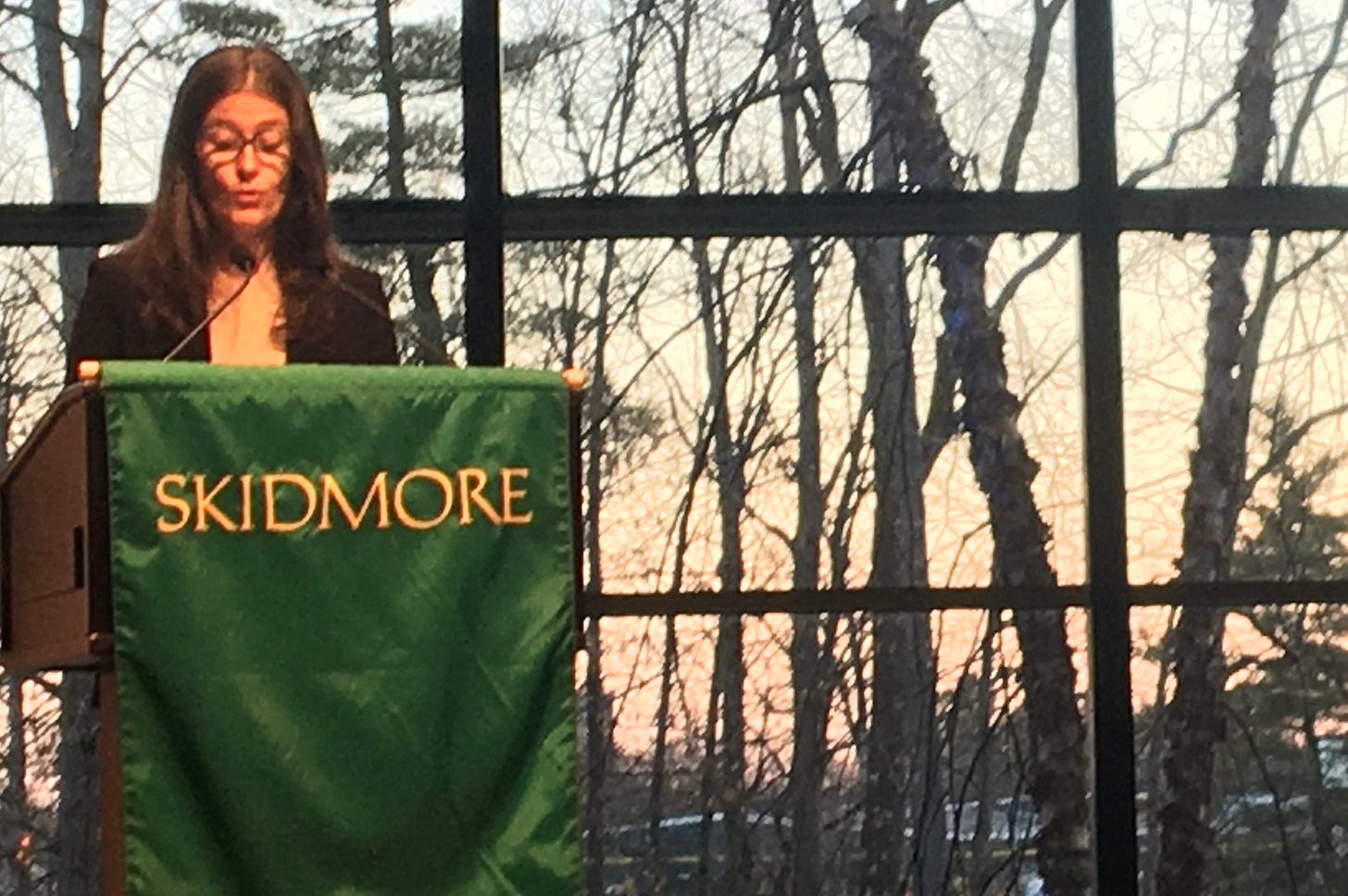Times reporter takes us behind scenes of Harvey Weinstein investigation
Stefanik says country is “unrecognizable” since she took office
By Ken Tingley
The story was a reminder that journalists are human, too.
That they have doubts.
It was late at night after a long day of work and the two New York Times reporters were sharing a ride home to Brooklyn.
Megan Twohey remembered whizzing through the Manhattan streets with Jodi Kantor and feeling the weight of the story they were doing on the the sexual assault allegations against big-time Hollywood producer Harvey Weinstein.
It was after midnight. They were tired and beaten down and there in the darkness, they confronted their worst fears.
“We questioned whether anyone would really care,” Twohey said Monday night while speaking at Skidmore College.
“People told us that nothing would change,” Twohey continued. “After all that work and all the secrets were revealed, what if nobody cared?”
This is the part you need to remember about journalists, at least the really good ones.
It is not about getting the story on the front page or winning a Pulitzer Prize, it is about whether the story will resonate, will it spark change and make the world a better place.
“Jodi and I became journalists because we believe that people do care,” Twohey concluded.
“We were scared of failure,” Twohey continued. “We were scared we were not going to meet the high journalism standards.”
At one point, one of their editors questioned them about the validity of the story.
They admitted they did not have any of the documentation they needed. None of the dozen victims were on the record.
“You don’t have a story,” they were told.
So they kept going.
Twohey found one victim in the New York suburbs. When she visited her house, she was shocked when the woman answered the door.
“I can’t believe you found me,” the woman said. “I’ve been waiting for this knock on the door for 25 years.”
So many wanted to share their stories, but not their names.
Ultimately, the key to publication came down to a few women who agreed to tell their stories of abuse by Weinstein.
Laura Madden, now living in Wales, was assaulted by Weinstein while working on a movie in Dublin in the 1990s. When Kantor found her, she was going through a divorce and battling breast cancer.
“She was scared,” Twohey remembered.
Madden gathered her teenaged daughters in the kitchen and told them what had happened to her as a young woman and how she was considering being part of the New York Times story.
“Not only did they support her,” Twohey said. “But they told her about similar experiences their friends had.”
That is heroism.
It helped get the story published.
When they made a final call to actress Ashley Judd to go on the record, she told them she had been thinking a lot about it, then told them: “I am going to be a named source in your investigation.”
“There was even a Deep Throat figure,” Twohey said.
A corporate accountant who had confronted Weinstein for years about his behavior had finally had enough.
“He was so fed up, in this case it meant helping reporters,” Twohey said.
Three days after the story was published, there was an emergency meeting with The Weinstein Company Board of Directors where Weinstein argued he should be allowed to continue because there would be a movement to support his cause.
“There was a movement,” Twohey reminded the audience, but it turned out to be a movement much different than what he thought it would be”.
Two recounted how Weinstein’s brother Robert - who was also on the board - told him “You’re finished.”
Weinstein was terminated “effective immediately.”
Approximately 80 women came forward to accuse Weinstein of sexual harassment, abuse and assault. Seven months later he was arrested. He was found guilty on two counts and sentenced to 23 years in prison in New York and another 16 in California.
More powerful men like Charlie Rose and Matt Lauer were exposed for their own crimes. Hundreds of Southern Baptist Convention ministers’ misdeeds were also revealed.
And the #MeTwo movement was born. New laws made the workplace safer.
But even here, Twohey is cautious about the reporters’ role in a movement, in changing the world around them.
“Journalism is different than activism,” Twohey said. “We reporters gather the facts, pick up a pen and hope that by revealing the truth we make a difference.”
In this came, it eventually came with some fame and fortune.
The two reporters went on to win a Pulitzer Prize for their efforts.
They wrote a book about the experience called “She Said.”
“It’s one of the reasons we wrote the book,” Twohey said. “Journalism can feel like a bit of a mystery.”
And that book was made into an acclaimed film last year that highlighted the journalism far more than the crimes.
“There are times when I wake up in the middle of the night and get angry and sad over things I have witnessed,” Twohey said. “The only way to not drown in those emotions is to do my job.”

Stefanik to run again
It was no surprise that Rep. Elise Stefanik went back on her pledge to serve just five terms in the House of Representatives. After all, she has personally been very successful within the Republican Party. Unfortunately, that has not translated to great improvements for the people in her own district.
She seemed to confirm that on Tuesday.
“Our country is unrecognizable from when I first stepped into the arena to run for Congress,” Stefanik said in a statement.
There is some truth to that.
Rep. Stefanik’s behavior, especially over the past four years, is part of the reason for the divisions in her communities where she has regularly taken credit for things she did not do, and lied repeatedly about opponents and their positions on the issues.
The divisions within her district were not there when she first ran in 2014.
“The fight to save our country and our state will not be easy, but I have never been more determined to work my hardest to save America,” Stefanik continued in her statement.
I don’t believe the world I live in around Glens Falls needs saving, except from politicians like Elise Stefanik.





Sedition Stefanik’s main objective from the very beginning was self interest. She was never a moderate . She voted in opposition to the Republican position only when she was given permission to do so. It was all a ruse and still
Is.
Elise Stefanik ran her first two campaigns on repealing the ACA and replacing it with a bag of magic beans. I’m sure she regrets not being able to do that and dustbinned her pledge in order to continue making life worse for Americans.